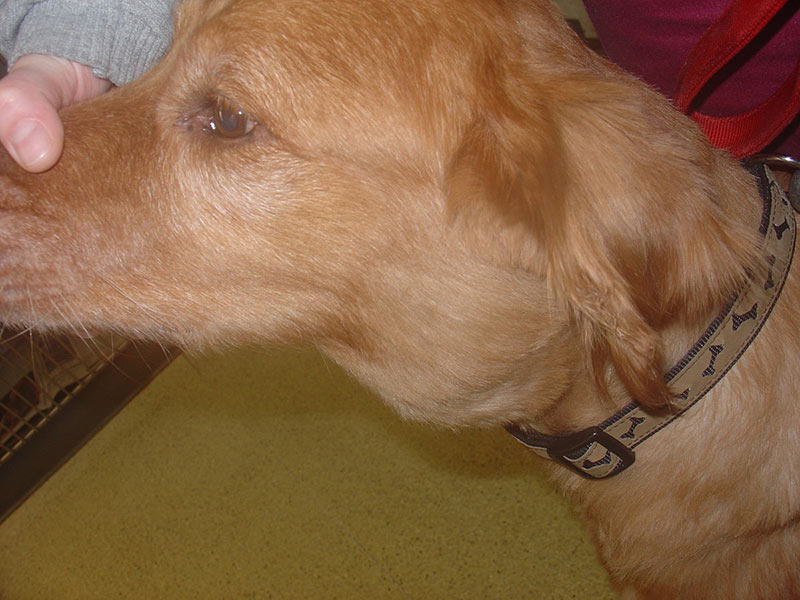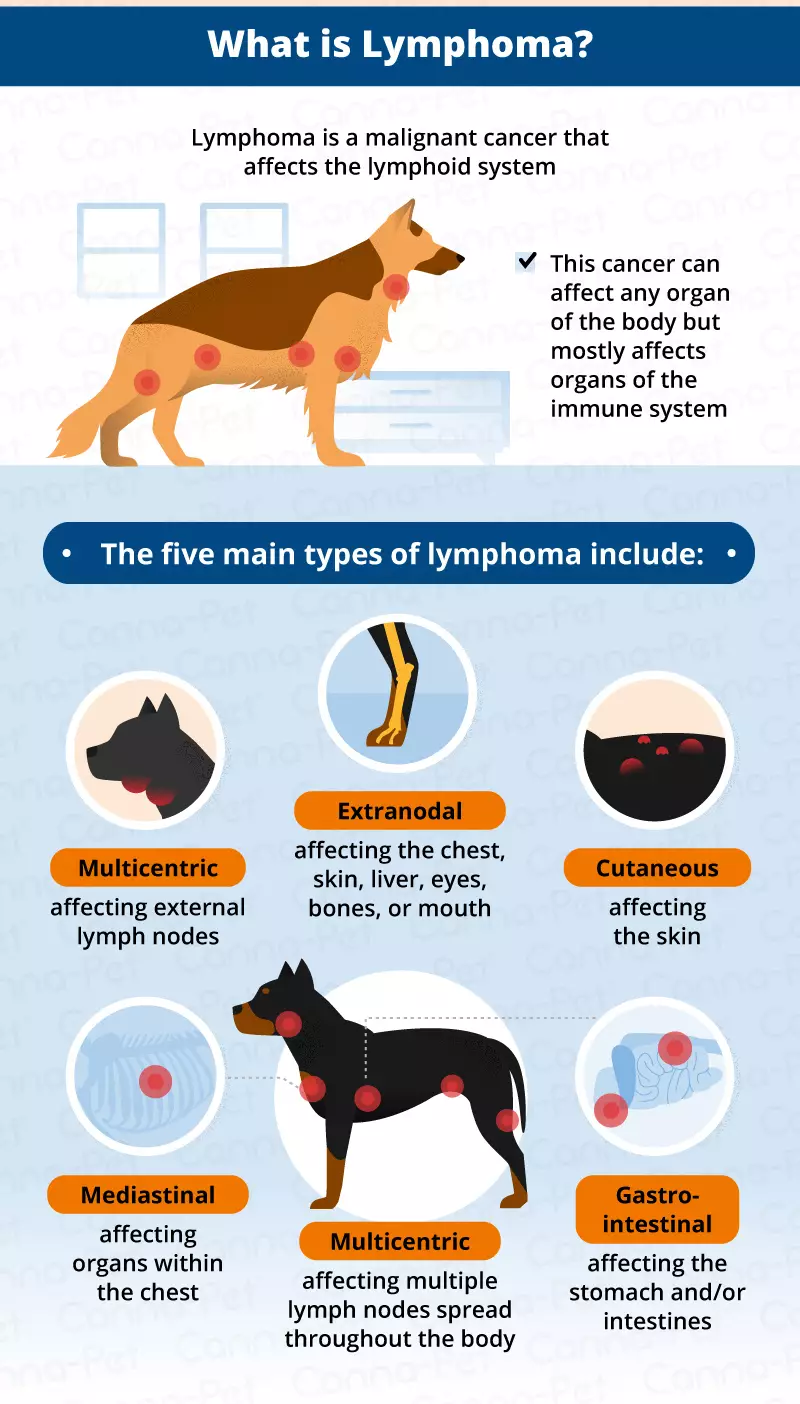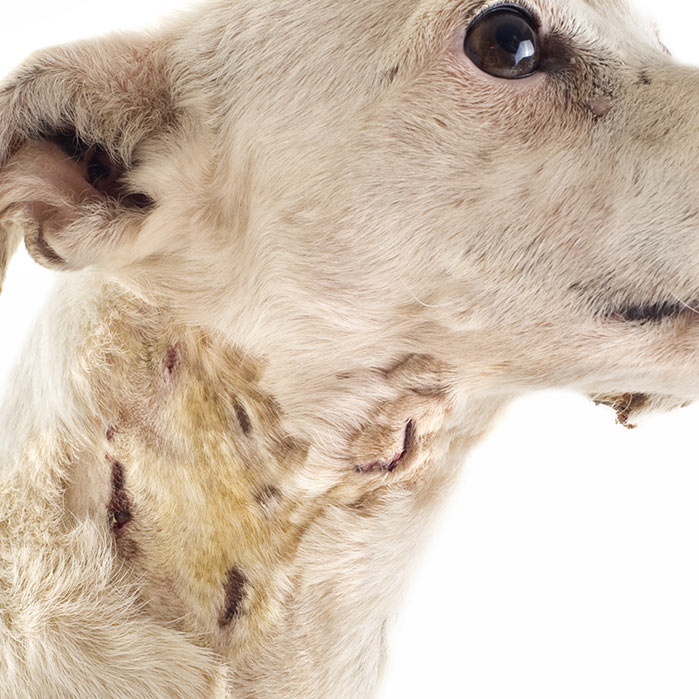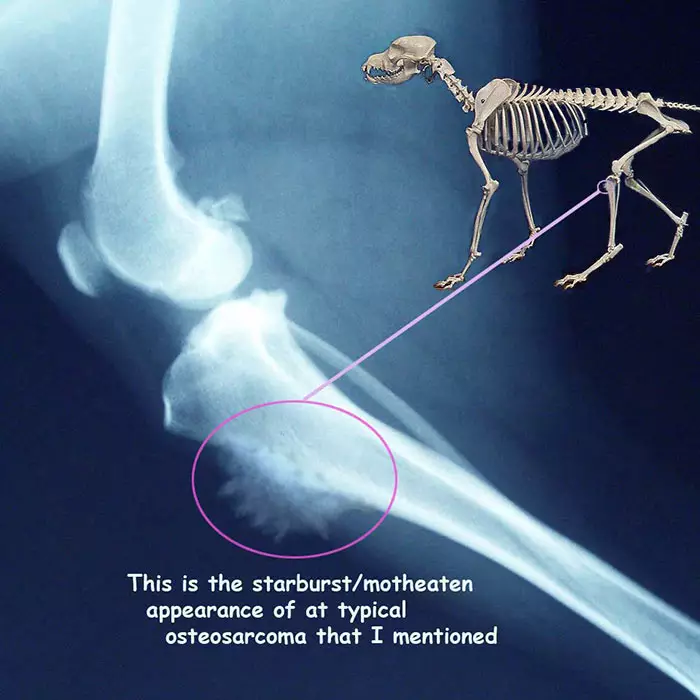Dog Lymphoma
What is lymphoma?
Lymphoma is a cancer which grows in the immune system’s lymphocyte cells. These white blood cells play an essential role in protecting the body from diseases.
The lymphoma affects one of the two types of lymphocytes: B or T cells. B-type lymphoma is most common in dogs.
Although it is rare, the following breeds have a higher disposition to the cancer than others: Boxers, Golden Retrievers, Saint Bernards, Basset Hounds, Airedale Terriers, Scottish Terriers and Bulldogs.

Lymphoma in a Golden Retriever
Source: https://en.wikipedia.org/wiki/Lymphoma_in_animals
Symptoms
Multi-centric lymphoma is the most common type affecting dogs, and causes pain-free swelling of the lymph nodes. Liver and/or spleen enlargement, haemorrhage and sepsis can also be signs of cancer, though most dogs do not show any specific signs.
Anorexia/weight loss: With a reduced appetite weight loss can quickly follow. If your dog is showing little enthusiasm for food, they are likely to be ill.
Ascites: abnormal accumulation of abdominal fluid.
Dyspnea: difficulty breathing, shortness of breath
Polydipsia & polyuria: excessive thirst and/or urination
Fever: like in humans, fever is characterised by an increase in bodily temperature.
Anaemia: a lack of red blood cells and/or haemoglobin in the blood.

Diagnosis
Diagnosing lymphoma in dogs is not difficult. Often a cytologic or histopathologic evaluation of the affected area is enough for a definitive diagnosis. If this is not successful in providing a diagnosis, flow cytometry can be used to amplify DNA sequences and identify the presence of abnormal lymphocytes.

Dog Lymphoma Infographic
Source: https://canna-pet.com/lymphoma-in-dogs/
Treatment and management
Treatment of lymphoma is dependent on what stage of advancement it is. Dogs who do not receive treatment often die within 4-6 weeks. Chemotherapy is the most frequently used form of treatment. On average, it takes about 6-8 months for the dog to enter remission, though if the cancer recurs, only 40-50% of dogs respond to treatment. If the disease is still in its early stages, surgery may be an effective solution.
Prevention
Like in humans, there is no definitive way to prevent cancer in dogs. However, keeping toxic agents (such as pesticides and garden products) and fumes (e.g. cigarette smoke) away from your dog, keeping the dog’s weight under control, managing any other health issues and keeping your dog anxiety- and stress-free are the best ways to decrease its risk. Exercise is also a great way to strengthen the dog’s immune system and keep it generally healthy and promote good blood circulation.

Interesting facts
Lymphoma is one of the most commonly occurring cancers in dogs, and in fact occurs between 2 and 5 times more likely in dogs than in humans. It is responsible for 20% of all dog cancers
Swollen lymph nodes can be felt (and sometimes seen) under the neck, in front of the shoulders and behind the knees.
Bow Wow Meow Pet Insurance can help protect you and your dog should an unexpected trip to the vet occur.
-
Find out more about our dog insurance options
-
Get an online pet insurance quote
Bow Wow Meow is proud to have been awarded winner of Canstar’s ‘Most Satisfied Customers’ Award in the Pet Insurance category for both 2024 and 2025!
Bow Wow Meow is proud to have been chosen as Product Review’s Pet Insurance Award Winner every year from 2018 to 2025! This is based on 2,995 independent customer reviews (as at 21/01/2025), with an overall rating of 4.3*
Google Review rating = 4.5* (based on 968 reviews)
Trust Pilot rating = 4.6* (based on 531 reviews)
Bow Wow Meow is proud to have been chosen as Product Review’s Pet Insurance Award Winner every year from 2018 to 2025! This is based on 2,995 independent customer reviews (as at 21/01/2025), with an overall rating of 4.3*
Google Review rating = 4.5* (based on 968 reviews)
Trust Pilot rating = 4.6* (based on 531 reviews)
Bow Wow Meow has been chosen as a winner in the Finder Pet Insurance Awards 2024. Finder’s panel of experts analysed over 140 quotes to award our Ultimate Care Plan the winner of the “Pet Insurance – Value” category.
More information
http://www.wearethecure.org/lymphoma







